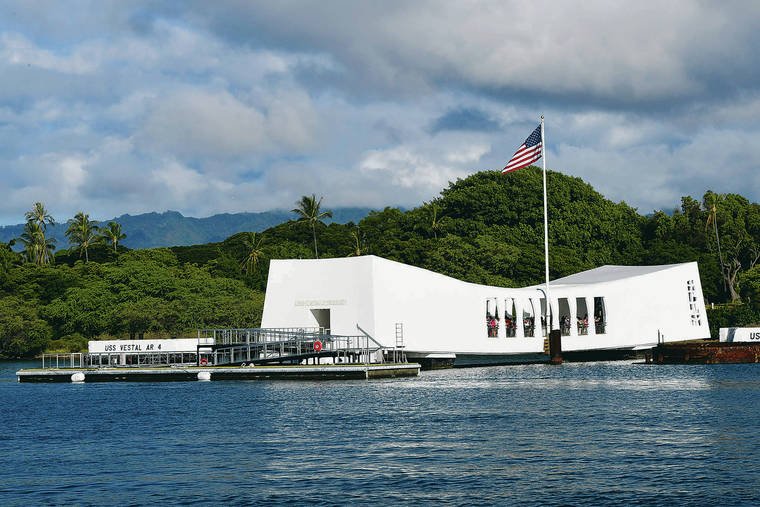Arizona Memorial, nearby museums hope Hawaii residents can help them bounce back

BRUCE ASATO / SEPT. 1
The USS Arizona Memorial, shown last year after the new dock was installed, normally draws 4,000 to 5,000 visitors daily.
The USS Arizona Memorial, a revered national shrine, and the three nonprofit museums that operate in its orbit in Pearl Harbor are scrambling to reopen on or as close as possible to the allowable June 19 date amid lessening but still very restrictive coronavirus Opens in a new tabconditions Opens in a new tab.
In the short term, visitation under reduced operations is expected to be kamaaina, or local residents, military and a smattering of tourists who come to Oahu despite a 14-day quarantine.
Adding to the complexity is a partnership with the Navy for boat service to the Arizona Memorial and permission for buses to pass over a bridge to get to the Battleship Missouri Memorial and Pearl Harbor Aviation Museum on Ford Island, which is part of an active Navy base.
Normally, the Arizona Memorial draws 4,000 to 5,000 visitors, mainly tourists, a day. A total of 1,177 crew members were killed on the battleship on Dec. 7, 1941, and it remains a sunken grave for more than 900.
Many also take in one or more of the other museums, including the USS Bowfin Submarine Museum and Park, which, like the others, relies on the next door Arizona Memorial visitor center for access.
The interconnected reopening, with appropriate health safety measures, can’t come soon enough for Mike Carr, president and CEO of the USS Missouri Memorial Association.
Don't miss out on what's happening!
Stay in touch with breaking news, as it happens, conveniently in your email inbox. It's FREE!
Coronavirus has been “financially devastating,” Carr said. “We’ve had no revenue since March 18. Zero.”
Some, if not all, of the museums have received Paycheck Protection Program government loans to help keep their workforces employed, one official said.
The current status of the “Mighty Mo” contrasts with the pre-coronavirus celebration in January of the 9 million visitors to step aboard the battleship since it became a museum in 1999.
The 887-foot warship, the site of Japan’s surrender ending World War II, is paired bow-to-bow with the Arizona.
“We’ve been paying everybody since the day we closed. We never laid anybody off or furloughed anybody,” Carr said of the staff of about 150. “We have a full crew here right now working on cleaning up the ship and getting us ready to reopen. This place is a beehive of activity.”
But much depends on the National Park Service getting the Arizona Memorial open again.
“We’re doing what we can from an operational and planning perspective to reorganize the visiting experience in a way that’s safe and enjoyable for the visiting public with the goal of re-establishing visitation as soon as we can — not necessarily June 19, but as soon as we can,” said spokesman Jay Blount.
On Thursday, Gov. David Ige approved Mayor Kirk Caldwell’s proposal to re-open designated indoor/ outdoor businesses and operations, including museums, starting June 19.
Across the country, some national parks and monuments are reopening, reflecting varying COVID-19 conditions. Yellowstone National Park entrances opened starting in May. The Statue of Liberty National Monument remains closed.
The Arizona Memorial’s Blount said the goal is to resume boat trips to the memorial and the park service is working with the Navy on that.
“That’s what we hope for,” Blount said. “Obviously there are a lot of factors that we still don’t know.”
He added that “each venue has a different set of circumstances that they have to consider when it comes to reopening.”
Chuck Anthony, a spokesman for Joint Base Pearl Harbor-Hickam, said Friday, “I don’t think a (reopening) date has actually been set in stone.”
“We’ve been working with the historic partners and are evaluating their proposals in how they want to go about doing it,” he added. “There are a lot of details as you can imagine that are being worked through here in terms of how many people at a time, face coverings, access on the buses, etc.”
Anthony said “whatever day the National Park Service opens up (the Arizona Memorial) again, we will be supporting them with white boats” to ferry visitors to and from the memorial.
How many people will be allowed per boat (which hold 150) and the sequencing of embarking and disembarking the memorial are being looked at, he said.
As for the viability of reopening with a limited audience, the Missouri’s Carr said, “Our board has committed to supporting all of our staff. From my perspective, if I’m paying everybody anyway, why wouldn’t I open?”
Staff at some of the other museums have to reorganize. Pacific Historic Parks, which provides key help at the Arizona, experienced furloughs.
Coronavirus has had “a tremendous impact,” said Elissa Lines, executive director of the Pearl Harbor Aviation Museum. “We’re a nonprofit organization. We went from a robust visitation to zero revenue in a day.”
“So we have trimmed our staff (and) we have positioned ourselves, we hope, to protect the museum and our employees,” she added.
Lines said the aviation museum is hoping “we’ll be ready, like the Missouri, to open by the 19th, should all of the other considerations be handled by that time.”
But longer-term financial damage has been done to the nonprofits.
“We’ve done financial projections out through the middle of next year,” Carr said, “and we do not expect to actually start turning a profit, quote, unquote, until the middle of next year — and that’s at 50% of what we would normally be expecting at that point.”



